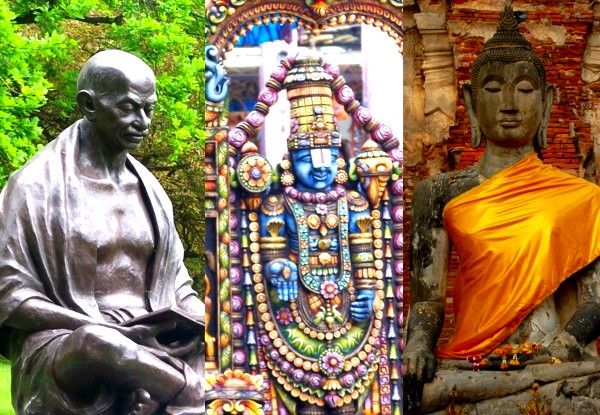A lady friend spoke with me after the event. I know her well and can certify that she is not a secular-extremist (the kind who have a distaste for every religion, especially their own). She is religious and liberal. She asked why I used the honorific ‘Lord’ for Lord Ram. I said I respect him. I worship him. I will call him Lord. She said that she sees me as a liberal who respects the women in his family; then how can I respect Lord Ram, who treated his wife unfairly? She then went on to make some very harsh comments about Lord Ram.In his answer to this accusation, Amish goes on to look at the lives of three great men - Ram, Mahatma Gandhi and Buddha - and concludes that great men often think of greater good of human beings and in the process are not always fair to their wives and their families, "We have every reason to love them, because they sacrificed their own lives so that we could have a better life. But had we been their family, maybe we would have cause to complain."

The way Amish explains it, it does make sense. However, I was wondering about a kind of gender bias in terms of such stories, where "great men" are excused for their family lives because they were thinking of greater good of the society, but are we equally understanding about "great women", when they want to sacrifice their family lives for the greater good?
So I was wondering are there similar examples of women. The only person I could think of was Mira Bai, though I think that it is not a perfect example. She sacrificed her family life because of her feelings of devotion to Krishna. Though her husband and her family did not like it and even gave poison to her, she is considered a saint by the people.
Another similar example can be of another woman saint from Karnataka - Akka Mahadevi. Can the readers give me other examples of such women as public figures who are respected or worshipped in India, though in terms of their family lives they were less than perfect? Or is it just men who "forget" their families in their quest for greater good?
At another level, similar accusations of mistreating their wives and families have been made against a number of artists, writers, film makers and public figures. Their public image be that of sensitive persons, and they make sensitive portrayals of women and life's injustices in their works, but their wives and families accuse them of neglect, psychological and even physical violence. Perhaps in this regard, it will be easier to find examples of successful women artists, writers and film makers, who have been accused of similar behaviour by their spouses and families!
Going back to the original debate that started this reflection - Amish's explanation about why he prefers to say "Lord Ram" and not just "Ram", I have another consideration. I agree that if you believe in a religion or a god or a figure and you wish to use words like Lord, bhagwan, prophet, etc., it is fine. These titles and words should reflect the faith and devotion you feel in yourself.
However, often the faithful get angry if others do not use such titles and take this as a kind of insult to their religion. They would like to force others to use these titles - in that case, I think that such words are empty of devotion, rather they are at best, a hypocrisy!
***






No comments:
Post a Comment
Thanks for visiting Arre Kya Baat Hai and for your comment! Please use a civilised language. Comments with embedded links are removed.